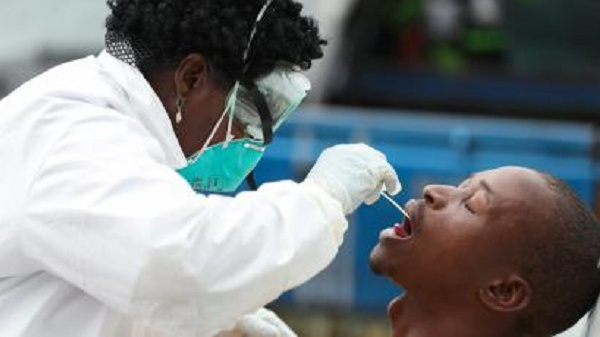 |
| Test on arrival is a key new rule in Uganda’s fight against the pandemic |
KAMPALA, Aug 23 (NNN-AGENCIES) — Starting Sept 3, all travellers arriving in Uganda, including citizens, will be subjected to a mandatory PCR Covid test before they are cleared to enter the country.
The Ministry of Health has revised travel guidelines, tightening Covid rules in the face of fake Covid-19 certificates, mutations of the virus and threats of a looming third wave in the country.
Previously, travellers were required to show negative coronavirus test results done 72 hours prior to travel before departure or entering the country.
Dr Jane Ruth Aceng, the Health minister, said all travellers will meet the cost of the test and those who test positive, will be subjected to institutional isolation at government designated facilities.
“All travellers (including children) irrespective of vaccination status or country of origin, are required to arrive with a negative PCR test done 72 hours prior to travel and will be required to undergo mandatory screening and carry out a PCR test at their own cost at all points of entry, including Entebbe International Airport,” Dr Aceng said.
“Any traveller (national or non-national), who tests positive for Covid-19, will be evacuated by the Ministry of Health to designated Covid-19 isolation facility.”
Previously, travellers who tested positive would be given a window for isolation at their place of preference. This window has been scrapped with exception of children.
The new measures seek to prevent the importation of more deadly variants of the virus that has so far killed 2,939 people in Uganda.
Dr Aceng said her ministry would undertake a Rapid Assessment Survey to establish, among others, the distribution of variants in the country.
Some mutations of the virus such as the alpha variant and the delta variant — discovered first in the UK and India, respectively — have been more transmissible than previous iterations of the virus and have gone on to dominate globally.
Uganda has so far registered at least five Covid variants, including the delta, and now seeks to contain the spread as the country struggles to vaccinate citizens.
The ministry has also revised the categories of countries that were earlier flagged as high risk, removing India from category one to category two effective Friday.
This means that passenger flights from India will be allowed, but travellers still have to meet the new requirements.
Uganda suspended flights from India in April when the country was hit by the deadly delta variant.
Travellers from countries, including Kenya, South Africa and the United States that were flagged in category two will also have to meet the new guidelines.
Dr Aceng, however, said effective Sept 3, Uganda will cease categorising of countries, and the new measures will apply to all travellers from all countries, regardless of vaccination status.
She said despite the drop in daily cases, positivity rate and number of critically ill patients, the country faces an adverse looming third wave if the population neglects adherence to standard operating procedures.
Projections by scientists show that in the event of a third wave, 4,000 people will contract the virus daily .
“Projections from our scientists show that the 3rd wave of the pandemic is likely to peak at 4,000 laboratory confirmed cases per day…higher than the second wave.
This means that 15 per cent of the patients will require admission at the health facility and about 89,311 patients may require HDU/ICU admissions,” Dr Aceng said. — NNN-AGENCIES



